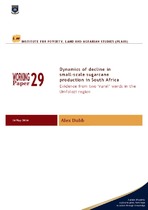Dynamics of decline in small-scale sugarcane production in South Africa: Evidence from two ‘rural’ wards in the Umfolozi region
Abstract
Using evidence from two rural wards in the Umfolozi region, this paper critically investigates the
dynamics and constraints of small-scale sugarcane production under conditions of decline. The
rapid decline in small-scale sugarcane production was historically underwritten by regulatory
reforms that paired processes of enhanced representational inclusion with measures of
rationalisation, resulting in deteriorating terms of exchange and the retraction of intensive
interventions in production by sugar millers (Dubb 2013). Together with drought, these changes
severely undermined the efficiency of capital services offered by local tractor-owning contractors
and the productivity of small growers as a whole, while social grants have acted as a barrier to
intensifying the exploitation of neighbours. The resultant cost-price squeeze has rendered cane an
increasingly unattractive site of investment of labour and wages, and witnessed the severe decline
or exit of most growers. For some, social grants have nonetheless provided a consumptive base
from which to commit homestead labour without drawing down on cane proceeds, and hence
enabled them to ‘hang in’ or marginally ‘creep-back’ into production. Only contractor-growers have
managed to increase production, but this in turn is premised on the precarious cross-subsidization
of their dual enterprises.

